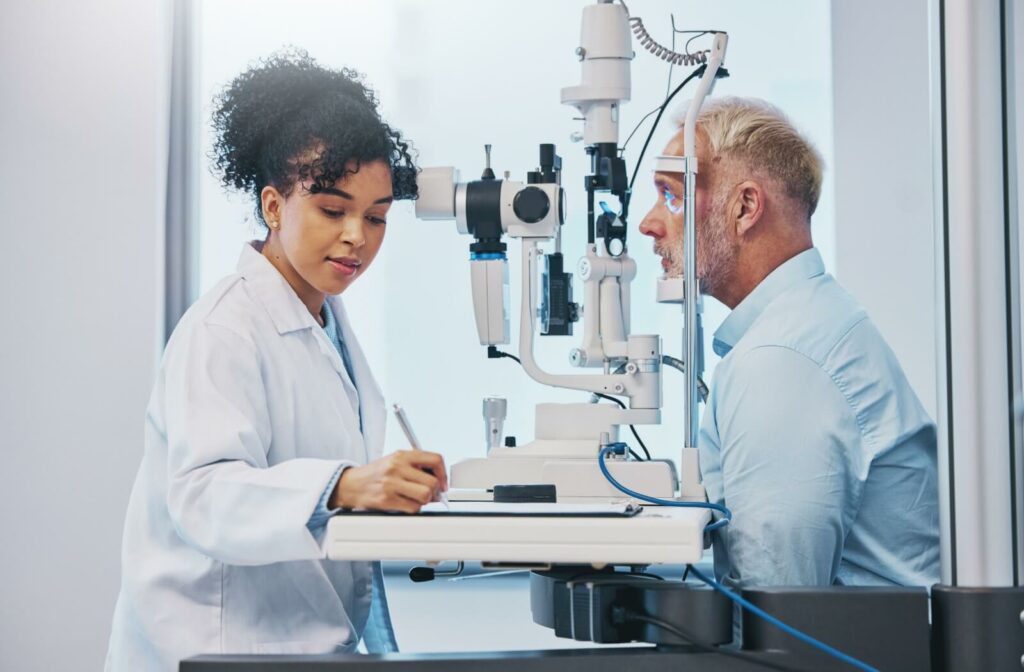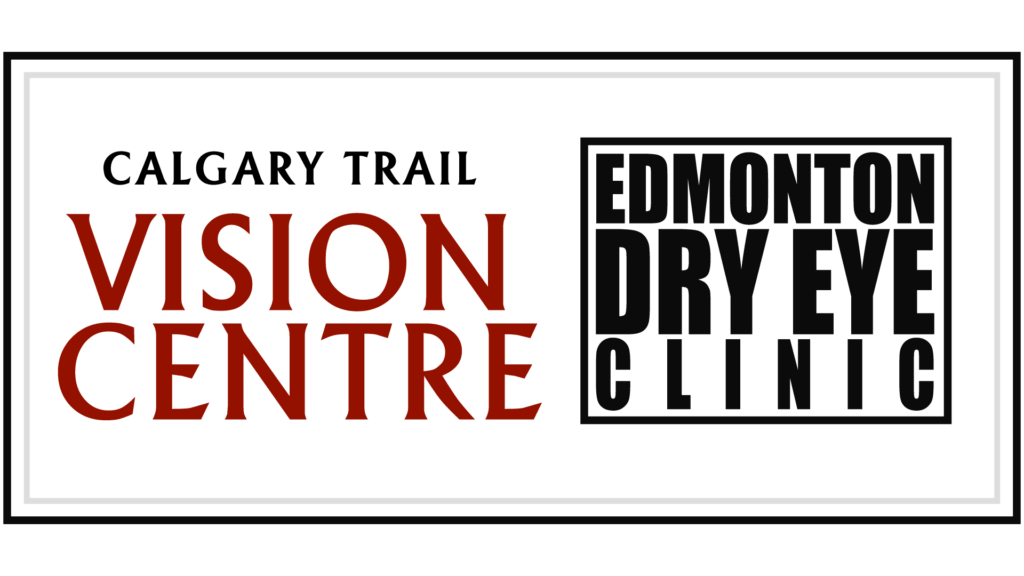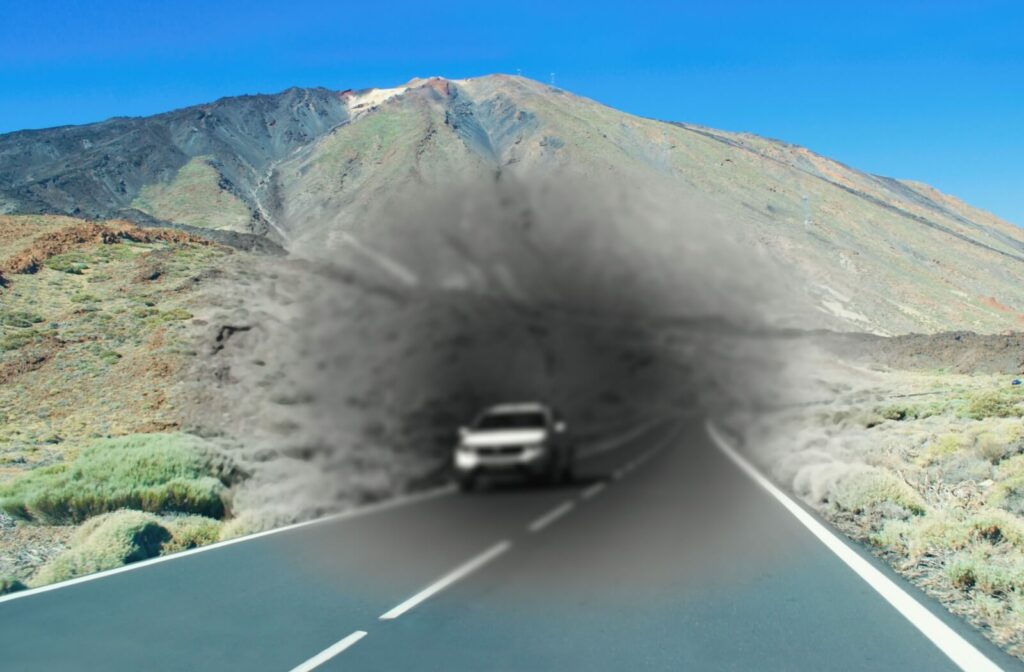Many eye problems, including sight-threatening diseases, develop with few or no symptoms. Macular degeneration and glaucoma are two such diseases and are the leading sources of blindness worldwide. Although these two diseases are unrelated and don’t affect each other, they do share risk factors, are both associated with age, and can both ultimately result in blindness.
Comprehensive eye exams and diagnostic technology help us detect early signs so we can act as soon as possible to preserve sight.
What is Macular Degeneration?
Macular degeneration or age-related macular degeneration (AMD) is the leading cause of severe vision loss in adults over 50. It primarily impacts the macula, the central part of the retina, which is responsible for sharp, detailed vision. When the macula deteriorates, the brain receives blurred or distorted images.
AMD has two forms: dry and wet. Dry macular degeneration is more common and develops over time, though no treatment exists. Wet macular degeneration is more advanced and grows more quickly because it causes abnormal blood vessel development under the macular.
Symptoms of AMD include:
- Blurred or distorted vision
- Difficulty recognizing faces
- Increased need for brighter light
- Gradual loss of central vision
Various factors contribute to macular degeneration, with age being the most significant. Other causes include genetic predisposition, smoking, obesity, and exposure to sunlight.
Treatment for Macular Degeneration
Treatment options for macular degeneration have advanced significantly over the years. Options include anti-VEGF injections, photodynamic therapy, and laser surgery. These treatments aim to slow the progression of the disease and preserve vision for as long as possible.
Risks Associated with Macular Degeneration
The risks associated with AMD are substantial. Vision loss can lead to difficulties performing everyday tasks, increasing the risk of falls and accidents. It can also cause emotional distress, including anxiety and depression, due to reduced independence and quality of life.
What is Glaucoma?
Glaucoma is a group of eye disorders that cause the optic nerve to deteriorate. The most common form of glaucoma is caused by excess fluid, which increases pressure and damages the nerve. Vision decreases gradually, beginning with peripheral vision, leading to permanent blindness.
Anyone can develop glaucoma, though the primary cause is elevated intraocular pressure (IOP). Other factors, such as genetics, age, and certain medical conditions, can also contribute. Blood flow to the optic nerve can be compromised, leading to nerve damage and vision loss.
Early stages of glaucoma often have no noticeable symptoms, earning it the nickname “the silent thief of sight.” As the disease progresses, individuals may experience:
- Peripheral vision loss
- Tunnel vision
- Blurred vision
Treatment for Glaucoma
Glaucoma cannot be cured, but can be managed to slow progression and preserve sight. Treatments include medications to lower IOP, laser therapy, and surgical procedures to improve drainage and reduce pressure. Early detection and consistent treatment are vital to managing glaucoma effectively.
Risks Associated with Glaucoma
The risks of untreated glaucoma are severe, potentially leading to irreversible vision loss. Early detection and treatment are crucial to managing the condition and preventing significant damage to the optic nerve. Regular comprehensive eye exams are highly recommended to evaluate eye pressure and optic nerve health.
Differences Between Macular Degeneration & Glaucoma
While macular degeneration and glaucoma are serious eye conditions, they affect different parts of the eye and have distinct characteristics. AMD impacts the macula and central vision, while glaucoma affects the optic nerve and peripheral vision. Understanding the differences between them is essential for accurate diagnosis and treatment.
Why Are Macular Degeneration & Glaucoma Often Linked Together?
Despite their differences, macular degeneration and glaucoma are often discussed together due to their prevalence in older adults and their potential to cause significant vision loss. Both conditions share common risk factors such as age and genetics, making them relevant in discussions about eye health in aging populations.
Is Either Condition Linked to Other Eye Conditions or Diseases?
Macular degeneration and glaucoma can be associated with other eye conditions. For instance, individuals with AMD might also have conditions like cataracts or diabetic retinopathy. Similarly, glaucoma can coexist with other diseases like ocular hypertension or uveitis. Understanding these links can help in comprehensive eye care and management.
The Importance of Regular Eye Exams

Regular eye exams are crucial in early detecting conditions like macular degeneration and glaucoma. Early detection can lead to timely treatment, potentially slowing the progression of these diseases and preserving vision. Eye health is essential to overall health, and regular check-ups can make a significant difference.
You can take preventative measures on your own time to supplement your eye care. A diet rich in leafy greens, fish, and nuts can provide essential nutrients for eye health. Regular physical activity, avoiding smoking, and using protective eyewear in bright sunlight can also significantly improve eye health.
However, none of that should replace regular eye exams, which are critical for monitoring any vision changes and can help in the early detection and management of eye conditions.
Calgary Trail Vision Centre advocates for prevention as the best medicine to help you and your family implement healthy practices for your eyes. Contact us today to book your next comprehensive eye exam.


